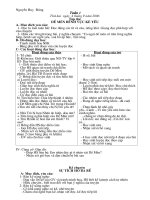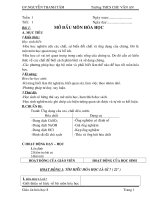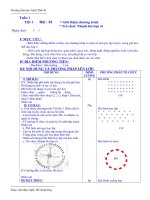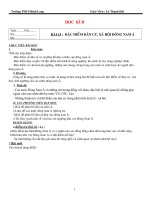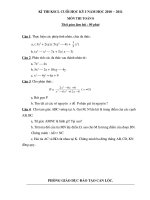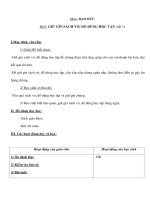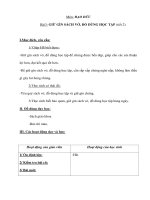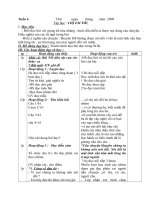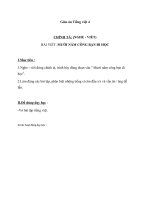GIÁO ÁN TIẾNG ANH LỚP 6 HỌC KỲ I
Bạn đang xem bản rút gọn của tài liệu. Xem và tải ngay bản đầy đủ của tài liệu tại đây (947.25 KB, 105 trang )
Prepare: 22 / 8 / 2010
Teaching: 23-25 / 8 / 2010
Period 1,2
HƯỚNG DẪN CÁCH HỌC MÔN TIẾNG ANH 6
I, Đặc điểm chung :
- Tiếng anh lớp 6 là cuốn sách đầu tiên của bộ sách dạy tiếng Anh 4 năm dùng cho
các trường THCS . Nội dung quyển sách là những chủ điểm gần gũi với cuộc sống ,
sát thực với mục đích , nhu cầu và hứng thú của các em .
- Tiếng Anh 6 giúp các em bước đầu làm quen với tiếng Anh đồng thời giúp các em
luyện tập để có thể nghe , nói , đọc và viết được tiếng Anh ở mức độ đơn giản
thông qua các bài học phong phú và sinh động .
- Tiếng Anh 6 gồm 16 đơn vị bài học . Mỗi đơn vị gồm 2 đến 3 phần ( A, B , C )
tương ứng với các chủ đề có liên quan chặt chẽ với nhau . Mỗi phần được học từ 1
đến 2 tiết học 45 phút , hs tiếp thu bài học thông qua tranh ảnh , băng đĩa và sự
hướng dẫn của gv …
II, Một số câu thông dụng trong tiết học :
- Look at the board : Hãy nhìn lên bảng
- Look at your book and listen to me: nhìn vào sách và lắng nghe
- Listen : Lắng nghe
- Listen and repeat : Nghe và lặp lại
- Read : đọc
- Write : viết
- Answer the questions : Hãy trả lời câu hỏi
- Good morning , teacher : chào cô ( thầy )
- Goodbye , teacher : tạm biệt cô ( thầy )
- See you again : hẹn gặp lại
- May I go out ? xin phép em ra ngoài được không ?
- May I come in ? xin phép em vào lớp được không ?
- Close your book: gấp sách lại
- Open your book: mở sách ra
- Stand up: đứng lên
- Sit down ngồi xuống
- Learn by heart new words: Học thuộc lòng từ mới
- Work in pair: Hãy làm việc theo cặp
- Work in group: Hãy làm việc theo nhóm
1
- Read in pair: đọc theo cặp
- Read individually: đọc c¸ nh©n
- Can you translate into vietnamese?:
- Can you translate into English?
- Keep silent : Hãy giữ im lặng/ trật tự
- Do you finish? – Yes, I do/ No, I don’t
- Are you ready? – Yes, I am/ No, I am not
- Do you understand ? Các em hiểu không?
Yes, I do/ No, I don’t
- Who can answer the question?/ Who can? Ai có thể trả lời được câu hỏi ?
2
Prepare: 27 / 8 / 2010
Teaching: 28 / 8 / 2010
Period 3
Unit 1 : GREETINGS
Section A : Hello ( A1,2,3,4)
I , Objectives :
By the end of the lesson Ss will be able to know to greet people and identify oneself
II, Language contents :
1, Grammar : Tobe
2, Vocabulary : hi , hello, name
III, Techniques : Listen and repeat , speak
IV, Teaching aids : cassette player , pictures
V, Times : 45 minutes
VI, Procedures
T and Ss’activities Contents
1, Warm-up : ( 5’ )
T : introduces the picture and sets the
situation .
Ss: look at the picture and guess what
the Ss are talking about .
T : introduces the new lesson
2, New lesson
A, Presentation : ( 12’ )
T : gives the situation
Ss: listen and repeat the tape
T : introduces new words
Ss: listen and repeat . Then practice
T : corrects their mistakes and explains
the way to use “hi” and “hello”.
B, Practice : ( 23’ )
T : asks Ss to practice
Ss: practice saying “hi” and “hello” in
pairs .
T : corrects their mistakes
T : introduces the situation
Ss: listen and repeat the tape
T : gives new words
Ss: listen and repeat . Then practice
1, Listen and repeat :
New words :
- Hello : ( explaination ) Xin chào
- Hi : ( explaination ) Xin chào
2, Practice :
3, Listen and repeat :
A, New words
- Tobe : is, am : ( translation ) là, thì
- name : ( example ) tên
B, Grammar : Cách tự giới thiệu tên mình
3
T : explains how to identify oneself
Ss : take note and give examples
T : plays the tape
Ss : listen and repeat . Then practice
T : corrects their mistakes
T : asks Ss to practice following the
model first
Ss: practice in groups
Ss : practice using their own names
Ss : comment
T : corrects their mistakes
3, Consolidation : ( 3’ )
T : reviews the main points
Ss: listen and remember
4, Homework ( 2’ )
T : asks Ss to :
Ss : take note
- I am ( I’m ) + tên : tôi là ….
ex : I am Nga
I’m Hoa
- My name is( My name’s) + tên : tên tôi
là…
ex : My name is Ba
My name’s Nam
4,Practice with a group :
-Learn by heart new words and structures
- Do A 1,2 in workbook
Prepare: 5 / 9 / 2010
4
Teaching: 6 / 9 / 2010
Period 4
Unit 1 : GREETINGS A 5,6,7
I, Objectives :
By the end of the lesson Ss will be able to know the way asking how people are
II, Language contents :
1, Grammar : simple present – question : How are you ?
2, Vocabulary : How are you ?
Fine / I’m fine
Thanks / thank you
And you ?
III, Techniques : listen and repeat , speak , write
IV, Teaching aids : pictures , dialogue build
V, Time : 45 minutes
VI, Proceduces :
T and Ss’ activities Contents
1, Warm-up :( 5’ )
T : greets Ss and identifies her name
Ss : do the same
T : asks some Ss write on the board
Ss : comment
( T : corrects and gives marks )
2, New lesson :
A, Presentation : ( 10’ )
T: sets the situation ( using picture ) and
plays the tape
Ss : listen and find out new words
T : gives new words
Ss : guess the meaning and take note
T : reads new words
Ss : listen and repeat . Then practice
T : corrects their mistakes and plays the
tape
Ss : listen and repeat
Ss : play role
Ss : comment - T : corrects
B, Practice : ( 25’ )
T: shows picture between Miss Hoa &
5, Listen and repeat :
New words :
- How are you ? : ( guiding questions)
- fine / I’m fine : ( example )
- thanks / thank you : ( explaination )
- and you ? : ( ex & explaination )
6, Practice with a partner :
- Miss : ( translation )
- Mrs : ( ex & translation )
5
Mr. Hung and guides the way to practice
( using dialogue build )
T : gives new words
Ss: take note , listen and repeat . Then
practice .
Ss: base on dialogue 5 to practice
Ss: play role
Ss : comment - T : corrects
Ss: do the same with picture between
Nam and Nga
Ss : play role
T : correctss their mistakes
T : introduces the dialogue build and
guides the way to exercise
Ss : practice in pairs
T : corrects their mistakes
Ss: take note in their exercise books
3, Consolidation : ( 4’ )
T : review the main points
Ss : listen and remember
T : asks Ss to say again the way to
greeting people and identify oneself
Ss : answer
T : corrects - Ss : take note
4, Homework : ( 1’ )
T : asks Ss to :
Ss : take note
- Mr. : ( ex )
Miss Hoa Mr. Hung
Mr. Hung : Hi , Miss Hoa .
Miss Hoa : Hello , Mr . Hung .
Mr. Hung : How are you ?
Miss Hoa : I’m fine , thanks . And you ?
Mr. Hung : Fine , thanks .
7, Write in your exercise book .
Nam : Hello , Lan . How are you ?
Lan : Hi , I’m fine , thanks . And you ?
Nam : Fine , thank you .
8, Remember .
- Hello / Hi
- I am ... = I’m …
- My name is … = My name’s …
- How are you ?
I’m fine , thanks / thank you .
- Learn by heart new words and structures
- Write A6 , 7 in notebook
- Do A3 in workbook
Prepare: 6 / 9 / 2010
6
Teaching: 7 / 9 / 2010
Period 5
Unit 1 - Section B : GOOD MORNING ( B1,2,3,4)
I, Objectives :
- By the end of the lesson Ss will be able to know saying goodbye
II, Language contents :
1, Grammar : simple present
2, Vocabulary : good morning , good afternoon , good evening , good night , goodbye ,
bye , children .
III, Techniques : Listen and repeat , speak , write .
IV, Teaching aids : cassette player , pictures .
V, Times : 45 minutes
VI, Procedures :
T and Ss’ activities Contents
1, Warm-up : ( 3’ )
T: calls 2 pairs to practice greeting &
asking how the people are .
Ss : practice in pairs
Ss : comment
T : corrects their mistakes and introduces
new lesson .
2, New lesson :
A, Presentation : ( 13’ )
T : asks Ss to look at the pictures and sets
the situation
Ss : look at the pictures and listen
T : plays the tape
Ss : listen and repeat
T : introduces new words
Ss : guess the meaning and take note
T : reads new words
Ss : listen and repeat . Then practice
T : corrects their mistakes and plays tape
Ss : listen and repeat . Then practice
B, Practice ( 25’ )
T : shows the pictures and explains the
way using again
Ss : practice with their partners
Ss : comment - T : corrects
1, Listen and repeat .
- good morning : ( picture & explaining )
- good afternoon : ( picture & explaining)
- good evening : ( picture & explaining )
- good night : ( picture & explaining )
- goodbye / bye : ( mime )
2, Practice with a partner.
7
Review : Back the board ( may be let Ss
saying in Vietnamese )
T: sets the situation and plays the tape
Ss : listen and find out new words
T : gives new words – reads
Ss : listen , repeat and prractice
T : plays the tape
Ss: listen and repeat . Then practice in pairs
T : controls & corrects
T : hangs flashcard on the board & guides
the way to do task
Ss : practice in pairs
Ss : comment - T : corrects
Ss : take note ( may be at home )
3. Consolidation ( 3’ )
T : reviews the main points
Ss : listen and remember
Ss : practice saying greetings again
T : controls & corrects
4. Homework ( 1’ )
T : asks Ss to :
Ss : listen and take note
Good morning Good afternoon
Good evening Good night
3, Listen and repeat .
- children : ( picture & explaining )
- We are … = We’re ….: ( translation )
- mom : ( example )
4, Write
Lan : Good afternooon , Nga
Nga : Good afternoon , Lan
Lan : How are you ?
Nga : I am fine , thanks . And you ?
Lan : Fine , thanks
Nga : Goodbye
Lan : Bye .
- Learn by heart new words & structures
- Do the rest exercises and B1,2,3 in
workbook
- Prepare the next period
Prepare: 08/ 9 / 2010
8
Teaching: 09 / 9 / 2010
Period 6
Unit 1 : Section C – HOW OLD ARE YOU ? ( C1,2 )
I. Objectives
At the end of the lesson Ss will be able to count from one to twenty
II. Language contents
Vocabulary : numbers
III. Techniques : listen and repeat , speaking
IV. Teaching aids : cassette player , flashcard
V. Times : 45 minutes
VI. Procedures
T and Ss’ activities Contents
1.Warm-up ( 6’ )
T and Ss talk about how people
are & greetings
T : introduces the new lesson
2. New lesson
a. Presentation
T : plays the tape once . Then
introduces numbers
Ss: listen and look at the
flashcard
T : plays each line
Ss: listen and repeat . Then
practice counting numbers from
one to twenty
T : controls & corrects
-Asks Ss write the numbers
from one to twenty in their
notebooks
b. practice
T : guides the way to
pronounce numbers
1. Listen and repeat
9
Ss : count from one to twenty
Ss: count from twenty to one
Ss: count even numbers
( 2,4,6,8,10,12,14,16,...)
Ss: count odd numbers
( 1,3,5,7,9,11,13,15,…)
1S : speaks numbers in
Vnamese
1S : speak in English
T : controls & corrects
3. Consolidation ( 6’ )
Game : Slap the board
4.Homework ( 1’ )
T : asks Ss to :
Ss: listen and take note
2. Practice
- Learn by heart numbers
- Do C1 in workbook
- prepare the next period
Prepare: 12 / 9 / 2010
Teaching: 13 /9 / 2010
10
Period 7
Unit1 : Section C – C 3,4,5,6
I. Objectives
At the end of the lesson Ss will be able to ask and answer about the ages
II. Language contents
1. Grammar : - This is Lan
- How old are you ?
- I’m twelve
2. Vocabulary : This is … ; year(s) old
III. Techniques : listen and repeat , speaking , ask and answer
IV. Teaching aids : cassette player , colored-chalk
V. Times : 45 minutes
VI.Procedures
T and Ss’ activities Contents
1. Warm-up ( 6’ )
T and Ss play Bingo game
( numbers from one to twenty )
2. New lesson
a. Presentation ( 15’ )
T : sets the situation and plays the tape
once
Ss : listen and find out new words
T : gives new words
Ss : take note , listen and repeat . Then
practice .
T : controls and corrects
- plays the tape
Ss : listen and repeat
- practice in pairs / groups
T : controls and corrects
b. Practice ( 20’ )
3. Listen and repeat
a. New words :
- This is … : ( mime & example )
- old : ( explanation )
- year(s) old : ( explanation & ex )
b. Grammar
11
T : introduces new structure
Ss : listen and take note
- gives examples
T : corrects mistakes
T : guides the way to practice
- gives models
- asks & answer with Ss
Ss : Practice in pairs
T : controls and corrects
3. Consolidation ( 3’ )
T : reviews the main points
Ss : listen and remember
4.Homework ( 1’ )
T : asks Ss to :
Ss: listen and take note
Hỏi tuổi người đang nói chuyện với mình
- How old are you ?
- I’m + số + ( years old )
ex : How old are you ?
- I’m eleven
- I’m eleven years old.
4. Practice with your classmates
- How old are you ?
- I’m ……….
5. Play Bingo
6. Remember
- numbers : one to twenty
- How old are you ?
I’m twelve
- Learn by heart new words and structure
- Do C 2,3,4 in workbook
Prepare: 13 / 9/ 2010
Teaching: 14 / 9/ 2010
12
Period 8
UNIT 2: AT SCHOOL
Section A - COME IN ( 1,2,3,4 )
I. Objectives:
By the end of the lesson, Ss will be able to use classroom imperative to understand
teacher’s commands.
II. Language contents
1.Vocabulary: come in, sit down, open...
2. Grammar: Imperative.
III. Techniques: communicative approach, asking and answering, pair work,
group work, guessing .
IV. Teaching aids: flash cards, pictures, realia
V. Procedures.
T and Ss’ activities Contents
1. Warm-up ( 5’ )
T and Ss ask and answer about the ages
Ss : comment
T : corrects and may be gives marks
2. New lesson
a. Presentation ( 10’ )
T : sets the situation and plays the tape
Ss : listen and repeat
T : gives new words
Ss : guess the meaning and take note
T : reads new words
Ss : listen and repeat . Then practice
T : corrects mistakes
* Checking: Rub out and remember.
b. Practice ( 20’ )
T : introduces the pictures and the ways to
do
task
Ss : look at the phrases and the pictures to
do
matching
Ss discuss the answers
Ss : comment - T : corrects
1.Listen and repeat . Then practice with a
partner
- come in (v) (pict. ).
- sit down # stand up (v) (action).
- book (n) (realia).
- open your book (act).
- close your book (act).
2. Match and write
a. Open your book.
b. Sit down.
c. Come in.
d. Close your book.
e. Stand up.
*Structure: Imperative
V + O /A
Ex: Open your book.
13
Ss : take note
T : explains the new structure : imperative
Ss : take note
T : gives imperatives
( Ss close their books )
Ss : action ( base on T’ commands )
3. Consolidation ( 9’ )
T : gives some exercises
Ss : practice in groups
Ss: comment
T : controls and corrects
Ss : take note
4. Homework ( 1’ )
T : asks Ss to :
Ss : take note
Further practice:
* Put the correct word in the brackets.
a. ..............down, please.
b. ...............your book.
c. ...............notebook, please.
d. ...............up, please.
e. ................in .
4. Remember
Come in.
Sit down # Stand up.
Open your book # Close your book.
- Learn by heart new words and structure
- Do A1,2 in workbook
Prepare: 15 / 9 / 2010
Teaching: 16/ 9 / 2010
14
Period 9
Unit 2: B. WHERE DO YOU LIVE ? ( B1,2 )
I. Objectives
By the end of the lesson Ss will be able to know the way to ask and answer name , the
address.
II. Language contents
1. Grammar: - What’s your name ?
My name’s ………..
- Where do you live ?
I live on ……. street / I live in ……….
2.Vocabulary: what, where, live, on, in, street, city, house.
III. Techniques: listen and repeat, ask and answer questions
IV. Teaching aids: cassette player, picture.
V. Procedures
T and Ss’ activities Contents
1. Warm-up ( 4’ )
T: gives imperative
Ss: do as request
T: comments and may be gives
marks
2. New lesson
a. Presentation ( 12’ )
T: uses picture to set the situation
- Introduces the situation and
plays the tape
Ss: listen and find out new words
T: gives new words
Ss: guess the meaning and take
note
T: reads new words
Ss: listen and repeat. Then practice
Ss: comment - T:
corrects
T: plays the tape
Ss: listen and repeat
1. Listen and repeat. Then practice the dialogue
with a
partner
a. New words
- what: ( example & explaination )
- where: ( example )
- live ( v ): ( example )
- on (pre ): ( action & example )
- street ( n ): ( picture )
b. Grammar
15
Ss: practice in pairs
T: controls and corrects
b. Practice ( 25’ )
T: introduces the new structures
Ss: take note and give examples
T: corrects their mistakes
T: asks about real information
Ss: answer about themselves
T: controls and corrects
T: explains the way to use “ I live
on/ in …..”
Ss: listen and remember
T and Ss ask and answer about the
address
Ss: practice in pairs
T: controls and corrects
3. Consolidation ( 3’ )
T: reviews the main points
Ss: listen and remember
4. Homework ( 1’ )
T: asks Ss to:
Ss: listen and take note
* Hỏi tên người đang nói chuyện với mình
- What’s ( what is ) your name ?
My name’s ( My name is ) + tên
ex: what’s your name ?
My name’s Lan
2. Play with words
- in ( pre ): ( action & ex )
- house ( n ): ( picture )
- city ( n ): ( ex )
* Hỏi bạn đang nói chuyện với mình sống ở đâu
- Where do you live ?
I live on ……….. street
I live in ( tên xã, huyện, thành phố ….)
ex: Where do you live ?
I live on Phan Boi Chau street
I live in Cuôr Knia
Exercises
1. What’s ……….. name ?
My ………. is Nga
2. Where do you ……… ?
I live ( on / in ) Ly Thuong Kiet street
I live ( on / in ) Buon Ma Thuot City
- Learn by heart new words and structures
- Do B3,4,5 in wokbook unit 2
Prepare: 19 / 9 / 2010
Teaching: 20/ 9 / 2010
Period 10
16
UNIT 2( CONT. ) B3,4, 5, 6
I. Objectives
By the end of the lesson Ss will be able to know the way to spelling their names & the
alphabet
II. Language contents
1. Grammar: How do you spell it / your name? L.A.N
2. Vocabulary: spell
III. Techniques: listen and repeat, ask and answer questions
IV. Teaching aids: stereo, colored chalk.
V. Procedures
T and Ss’activities Contents
1. Warm-up ( 7’ )
T: asks Ss to spell the alphabet again
Ss: answer
T: corrects mistakes and introduces the new
lesson
2. New lesson
T: introduces the alphabet
Ss: listen and repeat. Then practice
T: controls & corrects
Ss: practice
T: corrects mistakes
Presentation ( 10’ )
T: sets the situation and plays the stereo
Ss: listen and find out new words
T: gives new words
Ss: listen and repeat. Then practice
T: corrects and plays the stereo
Ss: listen and repeat. Then practice in pairs
T: controls and corrects
b. Practice ( 20’ )
T: asks Ss to respell the alphabet
Ss: spell
T: guides the way to practice spelling their
names
Ss: ask and answer spelling their own
names ( base on the dialogue ) in pairs
3. Listen and repeat
4. Listen and repeat
- spell ( v ): ( example )
- How do you spell it? ( explaination )
How do you spell your name? ( ex )
17
T: controls and corrects
T: guides the way to do task
Ss: ask and answer in pairs
1S: writes on the board
Ss: comment
T: corrects mistakes
Ss: take note
3. Consolidation ( 7’ )
T: reviews the main points
Ss: listen and remember
Ss: ask and answer the questions again.
T: controls and corrects
Ss: take note
4. Homework ( 1’ )
T: asks Ss to:
Ss: listen and take note
5. Write the answers in your exercise book.
a. My name’s ( Nga )
b. I’m twelve years old.
c. I live on Trần Phú street.
d. N.G.A- Nga.
6. Remember
What’s ( what is ) your name?
My name’s ( My name is ) ………
Where do you live?
I live on / in ………
How do you spell ………?
- Learn by heart new words,
- Practice asking and answering more.
- Do exercises in the workbook.
- Prepare the next lesson.
Prepare: 20 / 9 / 2010
Teaching: 21 / 9 / 2010
Period 11
18
UNIT 2: C. MY SCHOOL ( C1 )
I. Objectives
By the end of this period, the students will be able to:
- learn how to say what thing s are.
- use This /That positive statements and Y/N questions to talk about people and things at
school
II. Language contents
1. Vocabulary: this, that, student, teacher, class , classroom, desk
2. Grammar : - This / That is . . .
- Is this / that . . .
III. Techniques: - Communicative approach
- Pair work & group work
- Role play
IV. Teaching aids : Pictures, realia, a small ball, stereo.
V. Procedures :
T and Ss’ activities Contents
1. Warm-up ( 7’ )
T and Ss play a game:
Give the ball for the first student (S
1
)
S
1
says A – B – C ,then gives the ball for S
2
. S2 says D , then gives S
3
, . . . The student
who says Z , will win the game and get 1
mark , and then continues to say A – B,
……….
2. New lesson
a. Presentation ( 10’ )
T: Shows the picture to talk about subject “
School” and plays the stereo
Ss: listen and find out new words
T: gives new words
Ss: guess the meaning and take note
T: read new words
Ss: listen and repeat. Then practice
T: controls and corects
b. Practice ( 25’ )
T: plays the tape
Ss: listen and repeat. Then practice in pairs
T: controls and corrects
1. Listen and repeat. Then practice the
dialogue with a partner.
a. New words
- student ( n ): ( example )
- this is # that is: ( mime & ex )
- school ( n ): ( ex )
- class ( n ): ( ex )
- classroom ( n ): ( real )
- desk ( n ): ( real )
- teacher (n)
b.Grammar
- This is my desk.
19
T: introduces new grammar
Ss: take note and give examples
Ss: ask and answer about the real
information.
S
1
: Is this your ( desk )?
S
2
: No, it isn’t
S
1
:Is that your ( teacher )?
S
2
: Yes, it is
3. Consolidation ( 2’ )
T: reviews the main points
Ss: listen and remember
4. Homework ( 1’ )
T: asks Ss to:
Ss: listen and take note
- That’s ……school.
- Is this your class?
- ….that ….. teacher? - Yes,it is / No , it
isn’t
- Learn structures and dialogue by heart.
- Do exercise in workbook & Prepare next
part C2 –C4
Prepare: 21 / 9 / 2010
Teaching: 22 / 9 / 2010
Period 12
UNIT 2: C2, 3, 4
I. Objectives
20
By the end of this period, the students will be able to learn how to use “What’s this /
that?” “It’s a/an …………” to talk about things in the classroom.
II. Language contents
1.Vocabulary: a door, a window, a board, clock, . . .
2.Grammar : - What’s this / that?
- It’s a book / an eraser.
III. Techniques: - Pair work & group work. Dialogue build, picture drill
IV. Teaching aids : Pictures, flip charts, real object.
V. Procedures :
T and Ss’ activities Contents
1. Warm-up ( 6’ )
T: asks somes questions
- Is this your desk?
- Is that your teacher?
- Is this your book? ………
Ss: answer
T: comments and gives marks
2. New lesson
a. Presentation ( 20’ )
T: sets the situation and plays the tape.
Ss: listen and find out new words.
T: gives new words.
Ss: guess meaning and take note.
Ss: listen and repeat. Then practice.
Ss: listen to the tape and repeat. Then
practice.
T: controls and corrects.
Ss: look at the pictures and find out the
differences.
T: introduces new grammar
Ss: listen and take note.
Ss: give examples
T: controls and corrects.
b. Practice ( 14’ )
T: introduces new structures
2. Listen and repeat.
a. New words
- door ( n ): ( picture )
- window ( n ): ( picture )
- board ( n ): ( picture )
- clock ( n ): ( picture )
- waste basket ( n ): ( picture )
- school bag ( n ): ( picture )
- pencil ( n ): ( picture )
- pen ( n ): ( picture )
- ruler ( n ): ( picture )
- eraser ( n ): ( picture )
b. Mạo từ: a/an ( một )
- an: đứng trước một danh từ bắt đầu bằng
nguyên âm ( a, i, e, u, o )
- a: đứng trước một danh từ bắt đầu bằng
phụ âm.
ex: a pen
a clock
an eraser
3. Practice with a partner.
- What is this?
It’s a/ an + dtừ số ít.
21
Ss: listen and take note.
T: gives model first. Then gives examples
Ss: take note.
T: guides the way to practice.
Ss: base on the pictures in part1 to practice.
Ss: practice in pairs.
T: controls and corrects.
3. Consolidation ( 4’ )
T: reviews the mains points
Ss: listen and take note.
T asks Ss to retell the classroom vocabulary
Ss: answer
T: controls and corrects.
4. Homework ( 1’ )
T: asks Ss to:
Ss: listen and take note
- What is that?
ex:- What is this?
It’s a desk.
- What is that?
It’s an eraser.
4. Remember
What is this?
It’s a/ an ….
What is that?
This is ….
That is ….
This is my school.
That is my desk.
- Learn by heart new words and structures.
- Do exercises C in workbook.
- Prepare for the next period.
Prepare: 26/ 9 / 2010
Teaching: 27 / 9 / 2010
Period 13
UNIT 3: AT HOME
A. MY HOUSE ( A1, 2 )
22
I. Objectives
By the end of the lesson, students will be able to review the names of some objects
aroud them and know how to use plural nouns and questions in plurals.
II. Language contents
1. Grammar: plural nouns
2. Vocabulary: living room,telephone, lamp, bookshelf, couch, armchair, table, chair,
television, stereo, these, those, they.
III. Techniques: Communication, asking and answering, matching, rub out and remember.
IV. Teaching aids: Textbook, pictures, colored-chalks, cassette
V. Procedures
T and Ss’ activities Contents
1. Warm-up ( 5’ )
T: asks some questions
- What is this?
- What is that?........
Ss: answer.
Ss: comment
T: corrects and gives marks.
2. New lesson
a. Presentation ( 18’ )
T: sets the situation and plays the tape.
Ss: listen and find out new words.
T: gives new words
Ss: guess meaning and take note.
Ss: listen and repeat. Then practice.
T: controls and corrects mistakes.
T: plays the tape.
Ss: listen and repeat. Then practice.
Ss: comment
T: controls and corrects.
* Play game: Rub out and remember.
b. Practice ( 18’ )
T: asks Ss to retell the way to ask answer
questions with singular nouns. Then
introduces
the way to ask answer questions with
plural nouns.
1. Listen and repeat.
* New words
- living room ( n ): ( ex )
- telephone ( n ): ( picture )
- television( n ): ( picture )
- lamp( n ): ( picture )
- bookshelf ( n ): ( picture )
- couch ( n ): ( picture & ex )
- chair ( n ): ( picture )
- armchair ( n ): ( picture & ex )
- table ( n ): ( picture )
- stereo ( n ): ( picture )
- stool ( n ): ( picture & ex )
2. Practice with a partner.
23
Ss: answer question and take note.
T: introduces new structures.
Ss: listen and take note.
Ss: give examples.
T: corrects their mistakes.
T: guides the ways to practice and do
models first.
Ss: take note and remember.
Ss: base on the picture and the structures
to do task.
Ss: practice in pairs.
T: controls and corrects mistakes.
3. Consolidation ( 3’ )
T: reviews the main points
Ss: listen and remember.
4. Homework ( 1’ )
T: asks Ss to:
Ss: listen and take note
- this these
- that those
What are these?
They’re + dtừ số
nhiều( s/es)
What are those?
* Những dtừ tận cùng bằng chữ s, ch, sh, x, z
khi ở số nhiều phải thêm “es”.
ex1: what are these?
They’re armchairs.
ex2: What are those?
They’re couches.
* Những dtừ tận cùng bằng chữ o : trước o là
1 ng. âm ta thêm “s”; trước o là 1 phụ âm ta
thêm “es”
* Những dtừ tận cùng bằng chữ y : Trước y là
1 ng. âm ta thêm “s” ; Trước y là 1 phụ âm ta
đổi y thành i và thêm “es”
* Những dtừ tận cùng bằng chữ f, fe đổi thành
v và thêm “es”
* còn lại thêm s
- Learn by heart new words and structures.
- Write the questions and answer about the
objects in picture part2.
- Prepare for the next period.
Prepare: 27/ 9 / 2010
Teaching: 28 / 9 / 2010
24
Period 14
UNIT 3: A3, 4,5, 6
I. Obectives
By the end of the lesson, students will be able to ask and answer about person’s age , numbers in
a family.
II. Language contents
1. Grammar: + There are …. people in my family.
+ What’s his/ her name?
+ Who’s this/ that?
2. Vocabulary: people,father, sister, sister,brother, family, how many ,there are, too.
III. Techniques: Communication, asking and answering, matching.
IV. Teaching aids: Textbook, pictures, color chalks, cassette.
V. Procedures
T and Ss’ activities Contents
1. Warm-up: chatting ( 3’ )
T and Ss ask and answer about the members in
their families.
T: introduces new lesson.
2. New lesson
a. Presentation ( 20’ )
T: sets the situation and plays the tape
Ss: listen and find out new words.
T: gives new words .
Ss: guess the meaning and take note.
Ss: listen and repeat. Then practice.
T: controls and corrects
T: plays the tape.
Ss: listen and repeat. Then practice.
T: controls and corrects
T: introduces the possesive pronouns and
possesive adjectives.
Ss: listen and repeat. Then take note.
b. Practice ( 18’ )
T: sets the situation and guides the way to do
task
3. Listen and repeat. Then practice
a. New words
- father (n ): ( ex & picture )
- his: ( translation )
- he: ( ex )
- mother ( n ): ( ex & picture )
- her: ( translation )
- she: ( ex )
- too: ( ex )
- sister ( n ): ( ex )
- brother ( n ): ( ex )
- how many: ( translation )
- people: ( ex )
- family ( n ): ( explaination )
b. Grammar:
I My
She Her
He His
You your
4. Answer the questions
* What his/ her name? Tên anh/ chị ấy là gì?
25
